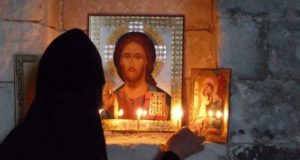رئيس الأساقفة كارلو ماريا فيغانو – في صمت يوم الجمعة العظيمة ، عندما تحضر الطبيعة نفسها بصمت تضحية الله – بالله! فلنسجد أمام الصليب.
Astiterunt reges terræ، et Principerunt in unum، adversus Dominum، et adversus Christum ejus (Ps 2: 2). لقد تحالف ملوك الأرض والرؤساء على الرب وعلى المسيح.
أليس هذا ما رأيناه يحدث أمام أعيننا لفترة طويلة ، طويلة جدًا ، لفترة طويلة؟ ألا يريد الأقوياء والنخبة إلغاء كل علاقة مع الله والتمرد على شريعته المقدسة؟ ألا يسعون إلى تشويه صورة الخالق في المخلوق ومثال الثالوث الأقدس في الإنسان؟ وكم مرة نجرب أن نبتعد عن نير المسيح الحلو ، وننتهي بجعل أنفسنا عبيدًا للعالم والجسد والشيطان؟
كل الليتورجيا اليوم تدوي بسخط الجلالة الإلهية. من فزع الآب القائم على تمرد أبنائه ؛ حزن الابن على جحود الانسان. من خيبة الأمل المريرة للروح القدس (الباراكليت) بسبب العناد الجنوني في الشر من أولئك الذين يجعلون أنفسهم أعمى عن الحقيقة وأصموا كلمة الله.
صمت عروس الحمل (الكنيسة)، التي جردت نفسها بالأمس في مذابحها ، مذكّرةً بتقسيم ثياب سيدها ، يعيدنا إلى قداس الجلجثة القاسي ، إلى العمل المقدس المهيب للعاطفة ، الذي كان المحتفل الإلهي يرنم الأنتيفون. Deus ، Deus meus ، quare me dereliquisti؟ – يا إلهي يا إلهي لماذا تركتني؟ (مز 21 ، 1) ، الذي أسيء فهمه من شهدوا تلك الطقوس.
قال إليام فوكات – وهو يدعو إيليا – أولئك الذين كانوا حاضرين ، غير مدركين أن أمامهم الله المتجسد الذي كان يحقق ، أمام أعينهم ، بالضبط ما تنبأ به داود في المزمور الحادي والعشرين. Speravit in Domino ، eripiat eum: salvum faciat eum ، quoniam vult eum – كان يأمل في الرب ، فليسلمه: دعه ينقذه ، لأنه يريده. وكرروا ، كما نقرأ في الآلام: Si Filius Dei es ، descende de cruce! – إن كنت ابن الله فانزل عن الصليب! ومرة أخرى: Diviserunt sibi vestimenta mea، et super vestem meam meam miserunt sortem – قاموا بتقسيم ثيابي بينهم ، وعلى ملابسي ألقوا الكثير. عند أسفل الصليب ، قام الجنود بدحرجة النرد (القرعة) من أجل ثوب الرب، دون أن يعرفوا أنهم بهذه البادرة كانوا يشاركون في التمثيل المقدس الذي تنبأ به الكتاب المقدس.
إن كنت ابن الله فانزل عن الصليب! يا لها من حماقة. وقد توّجوا إبن الله بوضع إكلل الشوك على رأسه، وبالصعود إلى الجلجثة وصلبه..
إن تضحية الإنسان ، حتى الأكثر بطولية وفظاعة ، لا يمكن أن تكون قادرة على إصلاح الجاذبية اللانهائية للخطيئة الأصلية والخطايا في جميع الأوقات: من أجل التمكن من تخليصنا من كوننا أبناء الغضب وإعادتنا إلى ترتيب النعمة ، كان من الضروري أن يموت الله على هذا الصليب ، أو بالأحرى الإنسان – الله ، الذي أجاب من كل الأبدية Ecce ، venio – ها أنا آتي – إلى صوت الآب ؛ هو الذي بسبب تجسده ، أعدت الحكمة الإلهية العذراء الطاهرة ، أسمى خيمة من العلي – دوموس أوريا – بيت الذهب ، تابوت العهد الجديد الأبدي ، مقر الحكمة.
لقد اخترقوا يدي وقدمي: لقد قاموا بترقيم جميع عظامي. وتلك الأيدي الأكثر قداسة ، تلك الأقدام المباركة المثقوبة بالمسامير، رغم أن العرف الروماني كان يقضي بربط المحكوم عليهم فقط بالصليب، كان ينبغي أن تفتح عيون الناس الذين سمعوا تلك الكلمات تتكرر في المجامع ، كلمات التي عرفها رؤساء الكهنة عن ظهر قلب ، الكلمات التي علّمها أطباء الشريعة لأطفال اليهود. لقد حذرني المزمور – أعطوني خلًا لأشربه – بينما حاول جندي أن يشرب الرب المحتضر بقصبة.

يجب أن نسأل أنفسنا ما إذا كان جهل الشعب اليهودي بسبب فساد السنهدريم لا يبدو تحذيرًا مروعًا لكبار الكهنة اليوم ، الذين يتحملون نفس القدر من المسؤولية عن جهل الشعب المسيحي؛ وإذا كان التهديد الذي رآه رؤساء الكهنة بعد ذلك في الناصري الوديع الذي أجرى المعجزات وبشر بالإنجيل ، لدرجة التآمر لإرساله إلى الموت بيد السلطة المدنية ، لا ينبغي أن يجعل رؤساء الكهنة الحاليين يرتعدون ، الذين حتى اليوم يلجأ إلى ملوك الأرض والأمراء لعرقلة مملكته ، بقصد وحيد هو الحفاظ على سلطتهم ومكانتهم الاجتماعية.
Vinea mea electa، ego te plantavi: quomodo converta es in amaritudinem، ut me crifigeres، et barabbam dimitteres؟ Sepivi te، et lapides elegi ex te، et ædificavi turrim. هذه هي كلمات جواب أول ليلة في Matins: يا كرمي الحبيب ، لقد زرعتك: كيف يمكنك أن تعطيني ثمارًا مرة ، إلى درجة صلبي وتحرير باراباس؟
إلى هذا الكرم ، المزروع بعناية شديدة ، تصرخ الحكمة الإلهية محذرة محبة ومعذبة: Convertere ad Dominum Deum tuum – تحوّل إلى الرب إلهك – وتكرره خلال آلام الآلام ، في التفكير في خيانة القدس ، ردة اسرائيل. نحن نرتجف ، أيها الأطفال الأعزاء ، عندما نفكر في مدى عظمة عذاب مخلصنا في التفكير في خيانة أولئك الذين افتديهم بدمه الثمين واشتروا بثمن الكثير من المعاناة ، واليوم مرة أخرى يحكم على الرب بالموت و اختر تحرير باراباس.
Tamquam ad latronem موجودون مع بعضهم البعض واستيعابهم: اقتباسات apud vos eram في Templo docens ، et non me tenuistis: et ecce flagellatum ducitis ad crossifigendum – لقد خرجت لتقبض علي ، كلص ، بالسيوف والنوادي: يوميًا كان معك في تعليم الهيكل ولم تفهمني وها أنت تهديني لأجلد وأصلب. كل يوم نسمع الرب يعلّم في كنائسنا ، من خلال أفواه وزرائه ، واليوم هناك من يتحرك ضده بالسيوف والعصي وكأنه فاعل شر. Adversus Dominum، et adversus Christum ejus – ضد الرب وضد مسيحه.
وإذا كان عذاب الرب الذي خانه أتباعه ، وتركه رسله ، وإنكاره وتركه تحت رحمة أعدائه ، لا يكفي لدفعنا إلى كره خياناتنا ، فلنفكر في الحزن المروع لقدسه الأقدس. الأم ، التي حملت ورضعت وربت الله ، رآه بالغًا ، ورافقته لمدة ثلاثين عامًا فقط لتراه يخونه من قبل أولئك الذين استفاد منهم أكثر من غيرهم ، أرسل ليموت من قبل أولئك الذين قبل أيام قليلة فقط هتف له بأنه ابن داود وملك إسرائيل.
لنتأمل سيدة الآلام ، التي اخترق قلبها الطاهر بالسيف ، وتبقى واقفة عند قدم الصليب مع القديس يوحنا. في تلك الساعات الرهيبة ، كان على الأمومة الإلهية للسيدة العذراء المباركة أن تعرف بطريقة فريدة وحميمة شغف ابنها المحبوب ، حتى تستحق لها لقب Co-Redemptrix.
إلى عذابها من آلام ربنا ، أضيفت معاناتها بسبب خطايانا ، سبب الكثير من الحزن على المخلص. كل واحد منهم اخترق قلب يسوع الأقدس وقلب مريم الطاهر ، ووحّد الابن الإلهي والأم الأكثر نقاءً في الآلام. يجب أن يكون هذا كافياً ، أيها الأطفال الأعزاء ، ليجعلنا نكره خطايانا ويحفزنا ليس فقط على التحول ، ولكن أيضًا لجعل كل نفس ، وكل نبضة من قلبنا ، وكل فكرة سببًا للراحة والراحة لهم ، بروح التعويض. والكفارة.
في صمت باراسيف ، عندما تحضر الطبيعة نفسها بصمت تضحية الله – الله! – لنشك في قساوة القلوب العديدة ، فلنسجد أمام الصليب ، ونكرر مع القديس فينانتيوس فورتوناتوس كلمات الترنيمة المهيبة التي سنرافق بها القربان المقدس من القبر إلى المذبح:
O Crux، ave، spes unica! – حائل يا كروس ، أملنا الوحيد! لنثني الركبة أمام حطب الخلاص الذي كرسه آدم الجديد.
مرهم آرا ، مرهم ، فيكتيما – حائل ، مذبح ؛ حائل ضحية.
Beata، cujus brachiis preium pependit sæculi: statera facta corporis، tulitque prædam tartari. – شجرة Blest ، التي حملت أغصانها السعيدة الثروة التي أعادها العالم ؛ الشعاع الذي كان يزن ذلك الجسم والذي رفع فريسة الجحيم المتوقعة.
دعونا نصنع آياتنا المعزية لكروكس فيديليس:
فليكتي راموس ، أربور ألتا ، تينسا لاكسا أحشاء ،
et Rigor lentescat ille quem dedit nativitas ،
غشاء عظمي عالي الدقة.
ثني فروعك ، الشجرة القديمة ،
الاسترخاء والصرامة الداخلية الخاصة بك ،
اجعل تلك الصلابة الأصلية ناعمة ،
وتمتد برفق على الخشب
أطراف الملك السماوي.
Pange ، lingua ، gloriosi lauream certaminis
و سوبر كروسيس تروفيوم ديك تريومفوم نوبلم ،
المؤهل Redemptor orbis immolatus vicerit.
غنّي يا لساني المجد
من المعركة المنتصرة ،
وفاز الكأس على الصليب.
أخبر عن الانتصار النبيل:
غزا مخلص العالم
بالتضحية بنفسه.
وقد يكون كذلك.
Abp. Viganò meditation for Good Friday: ‘Let us bend the knee before the wood of salvation’
Archbishop Carlo Maria Viganò – In the silence of this Good Friday, when nature itself silently attends the immolation of God – of God! – almost incredulous at the hardness of so many hearts, let us prostrate ourselves before the Cross.
Astiterunt reges terræ, et principes convenerunt in unum, adversus Dominum, et adversus Christum ejus (Ps 2 :2). The kings of the earth and the princes have allied themselves against the Lord and against Christ.
The Psalm which begins the First Nocturn of Matins on this day declaims succinctly. Let us break their bonds; let us cast away their yoke from us! Is this not what we have been seeing happening right before our eyes for a long, too long, a time? Do not the powerful and the elite want to cancel every tie with God and rebel against His holy Law? Do they not seek to disfigure the image of the Creator in the creature and the likeness of the Holy Trinity in man? And how many times are we ourselves tempted to withdraw from the sweet yoke of Christ, ending by making ourselves slaves of the world, the flesh, and the devil?
All of today’s liturgy resounds with the indignation of the Divine Majesty; of the dismay of the provident Father at the revolt of His children; of the sorrow of the Son over the ingratitude of man; of the bitter disappointment of the Paraclete at the insane obstinacy in evil of those who make themselves blind to the Truth and deaf to the Word of God.
The silence of the Bride of the Lamb, who yesterday stripped herself in her altars, recalling the division of her Lord’s garments, brings us back to the severe liturgy of Calvary, to the solemn sacred action of the Passion, whose divine celebrant intoned the antiphon Deus, Deus meus, quare me dereliquisti? – My God, My God, why have you abandoned me? (Ps 21:1), which was misunderstood by those who witnessed that rite.
Eliam vocat iste – He is calling Elijah – said those who were present, unaware of having before them the God Incarnate who was bringing to fulfillment, right before their eyes, exactly what David had prophesied in the twenty-first Psalm. Speravit in Domino, eripiat eum: salvum faciat eum, quoniam vult eum – He hoped in the Lord, let him deliver him: let him save him, since he desires him. And they repeated, as we read in the Passion: Si Filius Dei es, descende de cruce! – If you are the Son of God, come down from the cross! And again: Diviserunt sibi vestimenta mea, et super vestem meam miserunt sortem – They divided my garments among them, and for my clothing they cast lots. At the foot of the Cross, the soldiers rolled dice for the Lord’s seamless garment, without knowing that by this gesture they were taking part in the sacred representation prophesied by Scripture.
If you are the Son of God, come down from the cross! What foolishness. They did not understand that precisely because that man disfigured by the torments of the Praetorium, the scourging, the crowning with thorns, the ascent to Golgotha and the crucifixion was the Son of God, He did not want to descend from the cross.
The sacrifice of a man, even the most heroic and atrocious, could never have been able to repair the infinite gravity of original sin and the sins of all times: in order to be able to redeem us from being children of wrath and restore us to the order of Grace, it was necessary that God die on that cross, or rather the Man-God, He who from all Eternity had answered Ecce, venio – Behold, I come – to the voice of the Father; He who in view of whose Incarnation the divine Wisdom had prepared the Immaculate Virgin, the most worthy tabernacle of the Most High – Domus Aurea – the House of Gold, the Ark of the new and eternal Covenant, the Seat of Wisdom.
Foderunt manus meas et pedes meos: dinumeraverunt omnia ossa mea – They have pierced my hands and my feet: they have numbered all my bones. And those most sacred hands, those blessed feet that were pierced by nails, even though the Roman custom was that the condemned should only be tied to the cross, should have opened the eyes of a people who heard those words repeated in the synagogues, words that the High Priests knew by heart, words that the doctors of the Law taught to Jewish children. Potaverunt me aceto, the Psalm warned – they gave me vinegar to drink – while a soldier tried to give the dying Lord a drink with a reed.
We should ask ourselves if the ignorance of the Jewish people due to the corruption of the Sanhedrin does not sound like a terrible warning for today’s High Priests, who are equally responsible for the ignorance of the Christian people; and if the threat that the High Priests then saw in the meek Nazarene who performed miracles and preached the Gospel, to the point of plotting to send him to death by the hand of the civil authority, should not make the present High Priests tremble, who even today resort to the kings of the earth and to princes in order to impede His Kingdom, with the sole intention of maintaining their power and social prestige.
Vinea mea electa, ego te plantavi: quomodo conversa es in amaritudinem, ut me crucifigeres, et Barabbam dimitteres? Sepivi te, et lapides elegi ex te, et ædificavi turrim. These are the words of the Responsory of the First Nocturn of Matins: O my beloved vineyard, it was I who planted you: how could you have given me bitter fruit, to the point of crucifying me and setting Barabbas free? I fenced you off; I removed the stones from your soil; I built a watchtower for you.
To this vineyard, cultivated with so much care, Divine Wisdom cries her loving and tormented warning: Convertere ad Dominum Deum tuum – Be converted to the Lord your God – and repeats it during the pangs of the Passion, in contemplating the betrayal of Jerusalem, the apostasy of Israel. We tremble, dear children, in thinking of how great is the torment of Our Savior in contemplating the betrayal of those who, redeemed by His Most Precious Blood and purchased at the price of so much suffering, today once again condemn the Lord to death and choose to free Barabbas.
Tamquam ad latronem existis cum gladiis et fustibus comprehendere me: quotidie apud vos eram in templo docens, et non me tenuistis: et ecce flagellatum ducitis ad crucifigendum – You have come out to seize me, as a thief, with swords and clubs : daily I was with you in the temple teaching, and you did not apprehend me : and behold, you lead me to be scourged and crucified. Every day we have heard the Lord teaching in our churches, through the mouth of His Ministers, and today there are those who move against Him with swords and clubs, as if he were a malefactor. Adversus Dominum, et adversus Christum ejus – Against the Lord, and against his Christ.
And if the torment of the Lord betrayed by his folllowers, abandoned by His Apostles, and denied and left alone at the mercy of His enemies is not sufficient to move us to detest our infidelities, let us think of the dreadful sorrow of His Most Holy Mother, who conceived, nursed, and raised the Man-God, saw him become an adult, and accompanied him for thirty years only to see him betrayed by those whom he had benefited most, sent to die by those who only a few days before had acclaimed Him as the Son of David and the King of Israel.
Let us contemplate Our Lady of Sorrows, whose Immaculate Heart was pierced by a sword, and remain standing at the foot of the Cross along with Saint John. In those terrible hours the Divine Maternity of the Most Blessed Virgin had to know in a unique and intimate way the Passion of Her most beloved Son, so as to merit for Her the title of Co-Redemptrix.
To Her torment at the sufferings of Our Lord was added Her suffering over our sins, the cause of so much grief for the Savior. Each one of them pierced the Most Sacred Heart of Jesus and the Immaculate Heart of Mary, mystically uniting the Divine Son and the Most Pure Mother in the Passion. This should be enough, dear children, to make us detest our sins and spur us not only to convert but to make every breath, every beat of our heart, and every thought a cause of relief and comfort for Them, in a spirit of reparation and expiation.
In the silence of the Parasceve, when nature itself silently attends the immolation of God – of God! – almost incredulous at the hardness of so many hearts, let us prostrate ourselves before the Cross, repeating with Saint Venantius Fortunatus the solemn words of the hymn with which we will accompany the Blessed Sacrament from the Tomb to the altar:
O Crux, ave, spes unica! – Hail O Cross, our only hope! Let us bend the knee before the wood of salvation consecrated by the New Adam.
Salve ara, salve, victima – Hail, altar; Hail, victim.
Beata, cujus brachiis pretium pependit sæculi: statera facta corporis, tulitque prædam tartari. – Blest Tree, whose happy branches bore the wealth that did the world restore; The beam that did that Body weigh which raised up hell’s expected prey.
Let us make our own the consoling verses of Crux Fidelis:
Flecte ramos, arbor alta, tensa laxa viscera,
et rigor lentescat ille quem dedit nativitas,
ut superni membra regis mite tendas stipite.
Bend your branches, ancient tree,
relax your inward pith and rigor,
Make soft that native hardihood,
and stretch gently on your wood
the limbs of the celestial King.
Pange, lingua, gloriosi lauream certaminis
et super crucis trophæo dic triumphum nobilem,
qualiter Redemptor orbis immolatus vicerit.
Sing, my tongue, the glory
of the victorious fight,
and the trophy won on the Cross.
Tell of the noble triumph:
the Redeemer of the world conquered
by immolating Himself.
And so may it be.
 Agoraleaks Agoraleaks
Agoraleaks Agoraleaks







